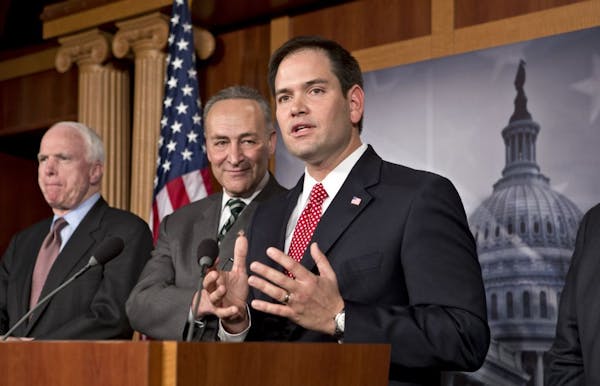Immigration reform is far from reality, but this week offered the first signs of progress in ages. On Monday, a bipartisan group of eight senators unveiled ideas similar to those President Obama championed in his 2011 "Blueprint for Immigration Reform," which he reiterated on Tuesday.
Unlike last year's harsh election rhetoric, the rare collegiality offered a hopeful sign. The president and senators share common ground on fixing the backlogged system for legal immigrants and their families. They differ on how to address illegal immigration, but agree on the need for increased border security, harsher measures for employers hiring illegal workers and a "tough but fair" pathway to citizenship.
Both plans acknowledge that reform is vital to the nation's economy. In recent years immigrants founded 25 percent of the country's top growth companies, including Google, eBay and Yahoo. High-skilled tech workers and innovators are critical to the U.S. economy and keeping America competitive in the global market.
To this end, the proposals smartly support green cards for legal immigrants earning advanced degrees in science, technology, engineering or math from an American university. Sen. Marco Rubio, R-Fla., Minnesota Democratic Sen. Amy Klobuchar and two other senators on Tuesday offered a sensible bill that would allow these graduates to stay in America rather than being sent home to work for competitors.
To ensure agricultural production and secure the country's food supply, the senators wisely advocate a special provision for critical farm laborers, who are doing work that many Americans won't.
Republicans, Democrats and the White House view illegal immigration as a matter of national security, and each plan calls for continued attention to border security, including more surveillance. At the same time, leaders of the reform push appropriately acknowledged that the nation's 11 million undocumented immigrants are largely hard-working people with families.
Both plans call for a streamlined pathway to citizenship for these immigrants' children through military service, education and other means. The Senate plan would award immediate legal status to adults who pass a criminal background check and pay fines and back taxes. Obama punctuated that citizenship isn't a given, but must be "earned" through a long, arduous process.
Unfortunately, the Senate plan makes citizenship contingent on border security first being "completed" -- an idea first advocated by President George W. Bush. It puts that determination in the hands of Southwest border state governors, attorney generals and civic leaders, which unnecessarily politicizes the process and gives those against a citizenship pathway a means to block it.
Besides, it's a flawed approach. No objective measure of "completion" exists. The Obama administration has surpassed all the goals that Bush advocated in the failed reform legislations of 2007. Border security guards, miles of fencing and deportations are at record highs. With several surveillance drones also in play, illegal crossings have dropped significantly, and a million fewer undocumented immigrants live in the United States than during the Bush era.
Obama garnered 71 percent of the Latino vote in November, an impetus driving Republicans to support reforms. But the polarized GOP-controlled House also needs to get on board and would be wise to follow the Senate in reaching across the aisle.
Obama was right this week in saying that the debate ahead will be painful and emotional. Yet it's necessary for the country's future. "Now is the time" for reform, he said. This week, finally, there's reason for optimism.
-----------------
An editorial of the Star Tribune, Minneapolis.
The courage to follow the evidence on transgender care

Republicans wanted a crackdown on Israel's critics. Columbia obliged.


